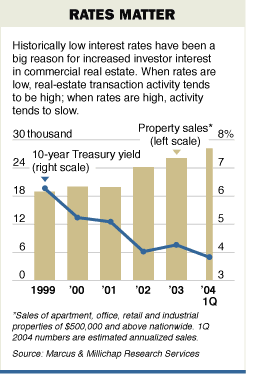
|
|
IN
THIS STORY
|
|

|
|
|
Now
that it's when, not if, the Federal Reserve will
raise interest rates, the question for commercial
real-estate investors is what will happen to
property values?
According
to forecasts from at least three real-estate research
firms, values and prices will decline sharply for office
properties. And values are expected to either fall --
though not as sharply as they will for office buildings --
or remain flat for apartment buildings, industrial
buildings and retail properties.
In
the real-estate industry, low interest rates have helped
fuel investor demand for commercial property by lowering
investors' borrowing costs. That demand, in turn, has
pushed up prices and values for commercial assets to
record levels, and has driven returns on new investment,
or so-called capitalization rates, down.
Some
analysts and observers believe higher interest rates will
reduce investor demand for real estate as the cost of
borrowing rises, cooling the market. So while the
property's capitalization rate would increase, prices and
values would generally fall or remain flat.
Over the
past five years, prices of office, industrial, apartment
and retail properties for transactions above $500,000 have
tended to rise when interest rates fall and vice versa,
according to research from Marcus & Millichap Research
Services, a division of Marcus & Millichap Real Estate
Investment Brokerage Co., of Encino, California.
|
The
fact that real-estate demand among tenants has been weak,
especially in the office sector, will make it increasingly
harder for building owners to raise rents enough to offset
the loss in value that comes with rising interest rates.
Harvey
E. Green, chief executive of Marcus & Millichap Real
Estate Investment Brokerage, predicts a 15% to 20% drop in
office-building values over the next two years if interest
rates rise 1.5 percentage points. Real Estate Research
Corp., based in Chicago, predicts a 10% to 15% decline
should interest rates rise that much. The Fed's current
target for its benchmark federal-funds rate, the rate
charged on overnight loans between banks, is at a 46-year
low of 1%.
The
problem with office buildings, says Jim Costello, a senior
economist with Torto Wheaton Research in Boston, is that
leases that expire between this year and 2008 will be
renewed or re-leased at lower rates, as rents have come
down from the market highs at which they were signed years
ago when the economy was strong. That, combined with
rising interest rates, is a big reason why the firms think
the office sector will be hit hard.
Torto
Wheaton and Real Estate Research both predict a similar
problem to a lesser degree for industrial properties.
Torto Wheaton forecasts a 6.9% decline in values in 2004,
while Real Estate Research sees 5% to 10% declines if
interest rates rise between one and two percentage points
over the next 12 to 18 months. Marcus & Millichap
predicts the values of industrial research and development
facilities and high-tech manufacturing properties would
suffer more than warehouse or distribution centers when
interest rates rise since those properties still have
higher vacancy rates.
The
firms don't all agree on the apartment sector, which has
suffered due to little demand and low interest rates
prompting would-be renters to become homeowners. Marcus
& Millichap expects price corrections in the weakest
markets. Real Estate Research expects values to hold up
because higher interest rates should give a boost to
apartment demand.
Torto
Wheaton's Mr. Costello thinks values will decline 4.2%
this year. "You still have some high vacancy rates in
the sector," he says, "and in general demand
just hasn't been that strong."
Rising
interest rates are seen by the three firms as having
little to no impact on retail property values largely
because of expected job growth, which would replace low
interest rates as a catalyst for spending and extend the
strong levels of consumer spending of the past few years.
Kenneth P. Riggs Jr., chief executive officer of
Real Estate Research, adds that values for retail
properties eventually will experience some minor "repricing,"
mainly because the level of pricing for these assets has
been so high as to be "unsustainable." But he
describes this repricing as more of a cyclical phenomenon
than interest-rate related.
|
